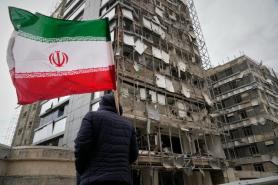
KENOSHA, April 19 (AJU PRESS) - The direct attack by Iran on the territory of Israel may lead to an escalation of war in the fraught region of the Middle East.
The encouraging news is that Israel in cooperation with Britain, the United States and – rather surprisingly – Jordan did an outstanding job of destroying the approximately 300 drones and missiles launched by Iran. This is dramatic testimony to the effectiveness of defensive anti-missile systems.
On the other hand, the attack is a clear break from the recent past. Iran characteristically uses proxies to launch terrorist and other attacks. The fundamentalist regime in Tehran is rightly regarded as a principal instigator of terrorist violence.
Iran’s leaders have in other circumstances shown restraint in use of force. In 1988, near the end of the long Iran-Iraq war, Saddam Hussein’s brutal regime launched massive poison gas attacks against Iran, killing and maiming thousands of people. Iraq was at the time a U.S. ally.
Tehran did not respond in kind.
That same year, U.S. naval forces mistakenly destroyed an Iranian civilian airliner, killing nearly three hundred people. Tehran did not retaliate, and accepted a financial settlement.
The incentive for this recent drone and missile attack was the killing by Israel of seven officers in an Iran consulate in Syria. Traditionally, consulates and embassies are considered protected territories, facilitators of communications among nations.
U.S. Secretary of State Antony Blinken is performing yeoman service in the Middle East and elsewhere. Our leaders have important advantages.
First, Israel remains dependent on American good will as well as aid. Our alliance is based on powerful shared history and values.
Second, important progress in the Middle East has occurred in the context of tensions and even disagreement between Israel and the U.S. President Jimmy Carter was able to achieve an historic treaty between Egypt and Israel. Though occasionally badly frayed, the accord essentially has held.
The Suez Crisis of 1956 remains the most serious and destructive of seemingly endless Middle East confrontations. President Dwight Eisenhower used economic leverage and astute diplomacy decisively to end a secretly planned old-style colonial military effort by Britain, France and Israel to recapture the Suez Canal, seized by Egypt’s new nationalist regime, and punish Egypt.
As usual, Ike’s instincts were correct, and American-Israeli relations eventually gained in consequence. There is no need for special anxiety among Americans because relations with our ally again have become characterized by serious tensions.
Third, U.S. leaders should slowly seek to expand the alliance with Turkey. The governing religious party is losing ground, and the military so far has not intervened. This contrasts with past crackdowns by the generals to guard the state’s secular constitution. Democracy is compromised but endures in Turkey, as elsewhere around the globe.
The George W. Bush administration’s invasion of Iraq was strongly opposed by Turkey. Fears that terrorism would be fueled proved fully justified, badly damaging relations with Washington.
More positive Turkey-U.S. relations are also very strongly rooted. During the first Persian Gulf War, U.S. B-52 bombers were deployed on Turkish soil, a potentially risky move by Ankara. Turkey played a vital Allied role during the Korean War; the UN military cemetery at Pusan contains a notably large number of Turkish graves.
Finally, we should combine aggressive pursuit of terrorists with efforts to reduce the American military presence in the Middle East. This combination is promising for long-term stability and U.S. influence.
Complete withdrawal from the volatile region, however, would be a mistake.
-------------------------------------------------------------------------------------------------------------------------
This article was contributed by Arthur I. Cyr, author of "After the Cold War -- American Foreign Policy, Europe and Asia" (NYU Press and Palgrave/Macmillan). He has taught at the Universities of Chicago and Illinois, Northwestern University, and Carthage College (Clausen Distinguished Professor).
Copyright ⓒ Aju Press All rights reserved.




